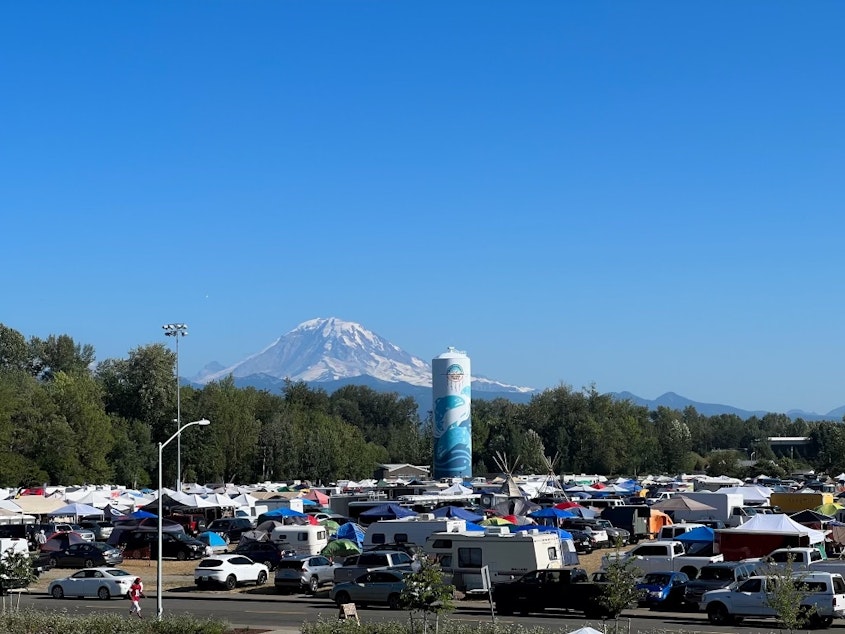Indigenous youth take up the paddle after pandemic pause

For the first time since the start of the pandemic, Native American tribes and First Nations from around the Salish Sea resumed their annual Canoe Journey to Seattle this summer. After paddling for hundreds of miles, they converged at the Muckleshoot Powwow Grounds near Auburn for a weeklong cultural celebration.
T
here are kids everywhere on the powwow grounds of the Muckleshoot Indian Tribe.
Some of them are in the stands with their family watching traditional dances by other tribes. Others are just getting back to their tent from swimming, or running around recycling bottles for change to buy a snack. Still others are taking a break from skateboarding at the vendors section. Some are just lounging around the campground.
A lot of these kids were deeply involved in the Canoe Journey in the days before the weeklong celebration, like Cassandra Solomon who was in the canoe, and helped out on the land as well.
Cassandra is only 14, but there are many in her singing group who are even younger. She said it was cold on the water, but there was a peacefulness to it.
Sponsored
“It was really great, even though my arms really hurt cause we were pulling for like two hours,” Cassandra said.
She rowed from Swinomish to Tulalip, switching on and off for eight hours, totaling a distance of around 25 miles.
Lawrence Solomon is a former chairman of the Lummi Nation, and Cassandra’s proud dad. Together with a few other nieces and nephews they form the Blackhawk Singers.
Aside from the senior Solomon, the group is made up of young people between the ages of 10 and 15.
“It's a big family organization and during those few years that we missed, now the kids really wanted to go on canoe journeys and was just like you know, to be patient,” Solomon said.
Sponsored
Many of the young participants have been looking forward to these canoe journeys since Covid-19 put them on hold. Some of them are here for the first time after waiting years to take part.

In an RV a few hundred feet away was Adam Jackson, a member of the Suquamish Tribe who works addressing child welfare issues. Jackson said kids being raised by the community is part of how his and other tribes operate, and the Canoe Journey and the cultural celebration that follows are a great example of that.
“Coming out on a journey really gives them the opportunity to see that they have family, that they always have aunties, that they have uncles, they have someone they can call dad,” he said.
Jackson is also a basketball dad, driving his kids from game to game. He sees the Canoe Journey as another way to bring kids into their culture.
Sponsored
“The deeper meaning really is, how valuable it is for our youth and how valuable it is for our children coming up,” Jackson said, “to not only have that sense of that community, but to learn. So, traditions and cultures and language and different things that you know, were close to being lost but that are now being restored.”
Organizers say about 10,000 people arrived at the beaches of Alki on the last official day of the journey. That included the Duwamish Tribe, which has yet to be federally recognized, and canoes shipped over from Hawai’i.
“Can you imagine 10,000 indigenous people getting together 100 years ago, you know, in this region?" asked Donny Stevenson, vice chair of the Muckleshoot Indian Tribe. "That would have been, that would have been a nightmare for colonial parties.”
One-hundred years ago, Native American boarding schools across the Northwest took Indigenous children from their communities in an attempt to cut them off from their language, land, and culture. Indigenous people were continuously displaced. Some things have changed since then.
“And so to be able to celebrate that in the way that we do, it's, it's meaningful,” Stevenson said.
Sponsored
Among other things, Stevenson sees the increase of young Indigenous kids like Cassandra getting involved in events like the Canoe Journey as a sign of the growing strength of Indigenous culture.
His own children have been taking classes on how to speak his traditional language. Stevenson said he knows a lot of the formal language, but not as well as his children.
“My kids can have a conversation with each other in a way that I can’t,” he said.
The Suquamish Tribe was the last stop before arriving at Alki Beach. Tribal Chairman Leonard Forsman said he was surprised that there were a lot of people 25 and under who showed up in Suquamish at 3 a.m. when the canoes arrived.
Forsman said a lot of people of his generation that have maintained this tradition, with the hope that it would continue.
Sponsored
“And the young people just grabbed onto it," he said. "They don't even need that much direction.”

